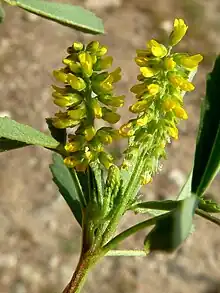ذرق
Arabic
| Root |
|---|
| ذ ر ق (ḏ-r-q) |
.jpg.webp)
تذرق الطيور
Verb
ذَرَقَ • (ḏaraqa) I, non-past يَذْرُقُ or يَذْرِقُ (yaḏruqu or yaḏriqu)
Conjugation
Conjugation of
ذَرَقَ
(form-I sound, verbal noun ذَرْق)| verbal noun الْمَصْدَر |
ḏarq | |||||||||||
|---|---|---|---|---|---|---|---|---|---|---|---|---|
| active participle اِسْم الْفَاعِل |
ذَارِق ḏāriq | |||||||||||
| active voice الْفِعْل الْمَعْلُوم | ||||||||||||
| singular الْمُفْرَد |
dual الْمُثَنَّى |
plural الْجَمْع | ||||||||||
| 1st person الْمُتَكَلِّم |
2nd person الْمُخَاطَب |
3rd person الْغَائِب |
2nd person الْمُخَاطَب |
3rd person الْغَائِب |
1st person الْمُتَكَلِّم |
2nd person الْمُخَاطَب |
3rd person الْغَائِب | |||||
| past (perfect) indicative الْمَاضِي |
m | ذَرَقْتُ ḏaraqtu |
ذَرَقْتَ ḏaraqta |
ḏaraqa |
ذَرَقْتُمَا ḏaraqtumā |
ذَرَقَا ḏaraqā |
ذَرَقْنَا ḏaraqnā |
ذَرَقْتُمْ ḏaraqtum |
ذَرَقُوا ḏaraqū | |||
| f | ذَرَقْتِ ḏaraqti |
ذَرَقَتْ ḏaraqat |
ذَرَقَتَا ḏaraqatā |
ذَرَقْتُنَّ ḏaraqtunna |
ذَرَقْنَ ḏaraqna | |||||||
| non-past (imperfect) indicative الْمُضَارِع الْمَرْفُوع |
m | أَذْرُقُ or أَذْرِقُ ʔaḏruqu or ʔaḏriqu |
تَذْرُقُ or تَذْرِقُ taḏruqu or taḏriqu |
يَذْرُقُ or يَذْرِقُ yaḏruqu or yaḏriqu |
تَذْرُقَانِ or تَذْرِقَانِ taḏruqāni or taḏriqāni |
يَذْرُقَانِ or يَذْرِقَانِ yaḏruqāni or yaḏriqāni |
نَذْرُقُ or نَذْرِقُ naḏruqu or naḏriqu |
تَذْرُقُونَ or تَذْرِقُونَ taḏruqūna or taḏriqūna |
يَذْرُقُونَ or يَذْرِقُونَ yaḏruqūna or yaḏriqūna | |||
| f | تَذْرُقِينَ or تَذْرِقِينَ taḏruqīna or taḏriqīna |
تَذْرُقُ or تَذْرِقُ taḏruqu or taḏriqu |
تَذْرُقَانِ or تَذْرِقَانِ taḏruqāni or taḏriqāni |
تَذْرُقْنَ or تَذْرِقْنَ taḏruqna or taḏriqna |
يَذْرُقْنَ or يَذْرِقْنَ yaḏruqna or yaḏriqna | |||||||
| subjunctive الْمُضَارِع الْمَنْصُوب |
m | أَذْرُقَ or أَذْرِقَ ʔaḏruqa or ʔaḏriqa |
تَذْرُقَ or تَذْرِقَ taḏruqa or taḏriqa |
يَذْرُقَ or يَذْرِقَ yaḏruqa or yaḏriqa |
تَذْرُقَا or تَذْرِقَا taḏruqā or taḏriqā |
يَذْرُقَا or يَذْرِقَا yaḏruqā or yaḏriqā |
نَذْرُقَ or نَذْرِقَ naḏruqa or naḏriqa |
تَذْرُقُوا or تَذْرِقُوا taḏruqū or taḏriqū |
يَذْرُقُوا or يَذْرِقُوا yaḏruqū or yaḏriqū | |||
| f | تَذْرُقِي or تَذْرِقِي taḏruqī or taḏriqī |
تَذْرُقَ or تَذْرِقَ taḏruqa or taḏriqa |
تَذْرُقَا or تَذْرِقَا taḏruqā or taḏriqā |
تَذْرُقْنَ or تَذْرِقْنَ taḏruqna or taḏriqna |
يَذْرُقْنَ or يَذْرِقْنَ yaḏruqna or yaḏriqna | |||||||
| jussive الْمُضَارِع الْمَجْزُوم |
m | أَذْرُقْ or أَذْرِقْ ʔaḏruq or ʔaḏriq |
تَذْرُقْ or تَذْرِقْ taḏruq or taḏriq |
يَذْرُقْ or يَذْرِقْ yaḏruq or yaḏriq |
تَذْرُقَا or تَذْرِقَا taḏruqā or taḏriqā |
يَذْرُقَا or يَذْرِقَا yaḏruqā or yaḏriqā |
نَذْرُقْ or نَذْرِقْ naḏruq or naḏriq |
تَذْرُقُوا or تَذْرِقُوا taḏruqū or taḏriqū |
يَذْرُقُوا or يَذْرِقُوا yaḏruqū or yaḏriqū | |||
| f | تَذْرُقِي or تَذْرِقِي taḏruqī or taḏriqī |
تَذْرُقْ or تَذْرِقْ taḏruq or taḏriq |
تَذْرُقَا or تَذْرِقَا taḏruqā or taḏriqā |
تَذْرُقْنَ or تَذْرِقْنَ taḏruqna or taḏriqna |
يَذْرُقْنَ or يَذْرِقْنَ yaḏruqna or yaḏriqna | |||||||
| imperative الْأَمْر |
m | اُذْرُقْ or اِذْرِقْ uḏruq or iḏriq |
اُذْرُقَا or اِذْرِقَا uḏruqā or iḏriqā |
اُذْرُقُوا or اِذْرِقُوا uḏruqū or iḏriqū |
||||||||
| f | اُذْرُقِي or اِذْرِقِي uḏruqī or iḏriqī |
اُذْرُقْنَ or اِذْرِقْنَ uḏruqna or iḏriqna | ||||||||||

ذَرْق
Declension
Declension of noun ذَرْق (ḏarq)
Noun
ذُرَق • (ḏuraq) m
- bird's-foot trefoil (Lotus corniculatus)
- blue melilot (Melilotus caerulea) or furrowed melilot (Melilotus sulcata) or elegant sweetclover (Melilotus elegans)
- sicklefruit fenugreek, sickle-shaped fenugreek (Trigonella corniculata syn. T. balansae, elatior, esculenta)
- a. 1248, ابن البيطار [Ibn al-Bayṭār], الجامع لمفردات الأدوية والأغذية [De simplicibus medicinis opus magnum]:
- حندقوقي بري: هو الذرق والحباقي أيضاً. ديسقوريدوس في الرابعة: لوطوس أغريوس ومعناه الحندقوقي البري وهو ينبت كثيراً بالبلاد التي يقال لها ليبوى وله ساق طولها نحو من ذراعين أو أكثر، ويتشعب منها شعب كثيرة ولها ورق شبيه بورق الحندقوقي الذي ينبت في المروج، ويقال له طريفلان، وله بزر شبيه ببزر الحلبة إلا أنه أصغر منه بكثير وهو كريه الطعم.
- Wild trefoil: It is the ḏuraq and also the ḥabāqīy. Dioskorides IV, 110: lōtós ágrios, meaning wild trefoil, grows copiously in Libya. It has a stalk of a length of two branches or more, and it branches off much. And it has leaves similar to trefoil growing on meadows. It has seeds similar to that of fenugreek, but much yellower and of a disagreeable taste.
Declension
Declension of noun ذُرَق (ḏuraq)
References
- Corriente, Federico, Pereira, Christophe, Vicente, Angeles, editors (2017), Dictionnaire du faisceau dialectal arabe andalou. Perspectives phraséologiques et étymologiques (in French), Berlin: De Gruyter, →ISBN, page 497
- Dozy, Reinhart Pieter Anne (1881) “ذرق”, in Supplément aux dictionnaires arabes (in French), volume 1, Leiden: E. J. Brill, page 485
- Freytag, Georg (1833) “ذرق”, in Lexicon arabico-latinum praesertim ex Djeuharii Firuzabadiique et aliorum Arabum operibus adhibitis Golii quoque et aliorum libris confectum (in Latin), volume 2, Halle: C. A. Schwetschke, page 86
- Lane, Edward William (1863) “ذرق”, in Arabic-English Lexicon, London: Williams & Norgate, pages 963–964
- Löw, Immanuel (1924) Die Flora der Juden (in German), volume 2, Wien und Leipzig: R. Löwit, page 481
- Wehr, Hans with Kropfitsch, Lorenz (1985) “ذرق”, in Arabisches Wörterbuch für die Schriftsprache der Gegenwart (in German), 5th edition, Wiesbaden: Otto Harrassowitz, published 2011, →ISBN, page 427
This article is issued from Wiktionary. The text is licensed under Creative Commons - Attribution - Sharealike. Additional terms may apply for the media files.
.JPG.webp)
